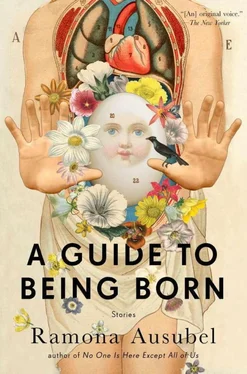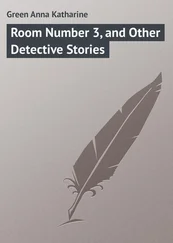• • •
IN THE MORNING there was a little girl sitting at my desk. She was watching my small television. I asked, “Are you looking for the ghost tour?”
“I have already been on it. I have done everything on this stupid boat,” she said, flipping channels.
“Where are your parents?”
“My dad works the bar upstairs for weddings. Today it’s a pink and white theme for Mr. and Mrs. Gravelthorn.”
“You have nowhere else to go?”
“It’s summer vacation. Don’t you have any kids for me to play with?”
“Not like that.”
“Can I stay here and draw?”
Before I answered, she set to work. She was surrounded by my life. The pictures of my family. Of Laura standing next to a cactus much taller than she was. Of us together in the car driving east, of Poppy as a baby and one of Poppy as a bigger kid. In this picture she is looking at the camera. I know that it just happened to be where her eyes went, that the flash drew her there, but looking at the picture feels like having her see me. Like she knows everything I want her to.
Dear Poppy,
When you were born they gave you to me and I loved you. You looked exactly like a baby. My mother said you had my eyes, but I didn’t care about that. You had eyes. You had your own face. You opened your mouth and I fed you. Your father’s hands were jealous while you nursed. You did not look at our eyes and you still don’t.
It took several weeks before they could tell us with any certainty that you would not grow up right. I hate remembering us then. We believed all day long that we could save you. We called experts all over the country. We drove you around in the car, me sitting next to you in back, singing, and your father steering us along. My mother flew in and stayed. People had answers for us, things to try, whole visions of how your life might turn out, you walking the stairs at the end of the school day with a heavy bag of books. Us a regular family. I can’t remember if there was a day when I changed the story, knowing you would lie where I placed you and stay there, your arms waving around and nothing I could understand going through your mind.
I mentioned to Dr. Keller that I was writing you letters lately, before the surgery, trying to explain your life to you. He told me that he wrote to both of his sons before their circumcisions. How he wanted to explain his reason for cutting them like that, the lineage of Jewish men they would be joining. He paused afterward, realizing, I think, that my letters were not the same thing. You will never read them. There will not be another ceremonial coming-of-age where I find you old enough to take you behind the dark stage of your life and show you the ropes and pulleys, show you the clanking steel and the costume room, and then the two of us reenter holding hands and the theater is full and we take a long mother-daughter bow and you go on being a woman after that. In this case, the letters remain in the box. I show them to no one. And you go on.
On the first tour, two kids got scared and had to be taken back by Britney, whose job it is to follow us along and remove anyone who is freaking out. There was only one couple left after that. It is much harder to lead a small tour, because you don’t get the group fear going. It’s just me, this dopey guide, acting afraid for the hundredth time. The husband was not interested at all in ghosts or in effects.
When the lights went out and the fake steam started to howl from the “broken” pipeline, the guy says to me, “So, like how many men would be working down here at a time, say?”
I tried to ignore him but he persisted, so I told him hundreds of thousands. The lights flickered on and off and the recorded sounds of screaming men echoed in the metal cavern. His wife seemed slightly frightened but never said anything during the entire tour.
“Now, were they unionized ?”
“Are you kidding me? Do you know what my job is?” I asked him. “My job is to scare you.”
“You don’t know how many men it took to build the ship originally, do you?” he called. “You don’t know shit! You just make stuff up!”
“My daughter is eight years old and she’s growing pubic hair. Does that scare you?”
“You are disgusting. I’m here to see a great ocean liner,” he said. “A historic ocean liner.”
I stopped saying anything. I led them through, room by room, signaled the effects and stood quietly while steam and lights and water did their jobs. At the end of the tour, I opened the doors to a fluorescently lit room with a few exhibits of life during the time the ship sailed. Pictures of the now creepy pool filled with happy swim-capped first-classers; a white lace dress such as a lady might have worn to tea in the afternoon. Normally we enter this room and exit right away. For a few minutes then, I can put my feet over the edge and kick them against the curved wood and breathe some actual air and call my wife, who puts the phone to Poppy’s ear so I can tell her I miss her. But this guy wanted to stay. This was the part he had been waiting for. He wanted the facts, not the story I wrote for him.
“Oh, look, Marjorie, what a pretty little teaspoon!” he said, and they stood there looking, their old noses pressed up against the glass. By the time they were finally done, there were nose-grease patterns, two dots side by side, on every case. I did not go hunt for Windex and I did not wipe down the cases. Their twin prints remained there, thin and foggy, while I invoked the dead for eighteen minutes on the hour and the half hour for the rest of the day.
Dear Poppy,
I wanted to buy something to wear to the surgery tomorrow. I want them to believe me, that I’m doing my best. If I arrive looking how I do most of the time, I think they’ll do less of a job for you. They need to think that we are the kind of family who demands good service. We rolled through the awful mall looking at pantsuits. I held them over you so you could see, but you were no help. When I tried them on, I looked like someone I would not like to be friends with. I bought a boring blue turtleneck sweater, but at least it’s clean. As we left the mall, in the central food court there was a little girl about three years old with gold curls bouncing on her shoulders, running ahead of her parents, who seemed entirely unbothered, yelling, “I’m African! I’m African! I’m African! I’m African!” In her mind, was she riding on the back of a zebra over a stretch of land so vast it would be days before she encountered someone who corrected her story, made her put her seat belt on, bribed her to eat six more bites of potatoes before dessert?
We went to the grocery store in the afternoon. I decided that I wanted to make a nice supper for us all. I chose a cart over a basket and made my way around the store with two sets of wheels, yours and the food’s. I chose lamb chops and the makings for salad. I put four red potatoes into a bag. I still think it’s weird to cook for only two. You do not ever, not ever, eat what I make. I think you are ungrateful sometimes. I think you do not even see what I do. You laugh and smile while I stir and chop. You laugh and smile while I measure your medicines and attach a new bag of food for you. You laugh and smile while I clean you.
An old lady in the cereal aisle stared up at me with my two vehicles. She looked into your bed and waited for me to pull you over so that she could pass.
“You are a saint,” she said to me.
“What am I supposed to do?” I asked back. “Take her outside and shoot her?”
Usually I am practiced at saying, “Thank you for saying so, but it’s no burden. She is always a blessing.” And this is not untrue. I imagine you gone and it seems horribly empty. I imagine the games of healthy children in the living room and the children seem like loud and insulting beasts. “I don’t mean that,” I told the old woman. “She is always a blessing.” She seemed to accept this, eager, too, to pave over my indiscretion. She wants this to be a place where God sends down the questions of twisted bodies and damaged brains but always sends with them the answers of wide hearts and abundant love.
Читать дальше












